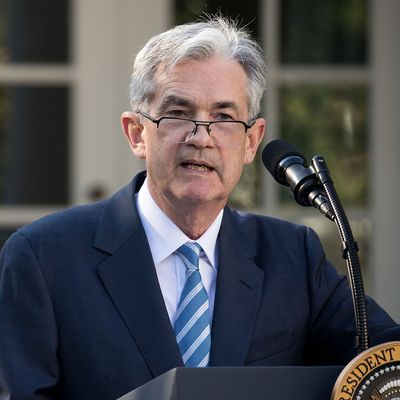
The last three chairs of the Federal Reserve were all reappointed by a president of the opposite political party. In her first term on the job, Janet Yellen presided over a steady reduction in unemployment, amid low inflation and a gentle wind-down in the central bank’s more extraordinary efforts to stimulate the economy in the wake of the financial crisis. In other words: Yellen had one of the most successful first terms of any technocrat-in-chief in modern memory.
But she’s also a liberal. And Donald Trump would like to make his “own mark.” So, Yellen will not be getting four more years.
Her replacement will be Jerome Powell. Trained as a lawyer, Powell transitioned into investment banking in the mid-1980s; served a brief stint as a Treasury Department undersecretary in the first Bush administration; then made a small fortune in private equity. Unlike every other Fed chair of the past four decades, the 64-year-old multimillionaire does not have a degree in economics. This does not necessarily mean that Powell is unqualified for the post (lord knows, an economics degree is no guarantee of competence at managing the economy). But it does mean that he has never explicated his economic views through a body of academic research.
Which is to say: Jerome Powell is about to have more power over the American economy than just about any other human being on planet Earth — and we know very little about how he thinks the economy works.
The Federal Reserve chair’s primary job is to try and maintain “full employment” while keeping inflation at a modest level (presently, the official target is 2 percent). He or she aims to perform this feat by moving the central bank’s benchmark interest rate up or down: When unemployment is high, the Fed lowers interest rates to encourage investment and stimulate the economy. When inflation is above 2 percent, and unemployment relatively low, the Fed moves interest rates up to do the opposite.
Whoever exercises this control over the money supply enjoys immense power over the economy. And how one chooses to balance the bank’s twin imperatives of combating unemployment and controlling inflation is intensely political. Creditors benefit from high interest rates, debtors suffer from them. The wealthy have little to fear from high unemployment, but something to lose from modest inflation. For the poor, the opposite is generally true.
Thus, conservative Federal Reserve governors tend to be eager to raise interest rates, and skeptical of monetary stimulus. The bank’s most right-wing members have spent most of the past decade shouting “runaway inflation is nigh” every few months, like cult leaders forever prophesying — and then revising — the date of the apocalypse. And yet, inflation remains too low by the Fed’s own (conservative) standard. Meanwhile, wage growth still leaves something to be desired.
So, there’s a lot at stake in the question of just what kind of monetary policy-maker Jerome Powell is. He’s widely seen as a Republican Yellen. Meaning: Unlike arch conservatives, Powell approves of Yellen’s slow, deliberate approach to bringing interest rates back up. However, when it comes to the Fed’s other big responsibility — regulating the financial sector — Powell is a bit more sensitive to the financial community’s desires than his Democratic soon-to-be predecessor.
There is some solid evidence for this assessment. Since joining the Fed’s board of governors in 2012, Powell has voted with Yellen consistently on matters of interest rates. He’s also a former investment banker, with deep roots in the Republican Party. So, ya know, not the biggest fan of financial regulation you’ll ever meet. Powell has advocated for legislation that forces financial regulators to apply cost-benefit analysis to new rules, and has evinced supported for rolling back some Obama-era regulations on Wall Street. That said, Powell has resisted conservative calls to loosen post-crisis capital requirements on large banks.
So, he’s generally understood as a pragmatic, center-right Republican who will make life a bit easier for Wall Street, without jeopardizing the healthy economy Trump inherited through sharp interest-rate hikes.
But we’re operating on scant evidence here.
“I don’t think it’s right to think of Powell as a Yellen clone,” Lewis Alexander, chief economist at Nomura Securities, told the New York Times. “In terms of the core issues of monetary policy, we just don’t have much of a baseline for him.”
As the Times notes, Powell has shown flashes of skepticism toward monetary stimulus — an inclination that could have enormous consequences the next time our economy dips into recession:
As a member of the Fed’s board of governors, Mr. Powell also raised concerns that the Fed was trying too hard to revive economic growth with its massive bond-buying program — calling into question whether he would be as willing as Mr. Bernanke and Ms. Yellen to use such tools again.
The Fed announced in September 2012 that it would launch a third round of bond buying, purchasing $85 billion a month in Treasuries and mortgage-backed securities until economic conditions improved to its satisfaction. The program was backed by Mr. Bernanke, then Fed chair, and Ms. Yellen, then the vice chairwoman, who argued the Fed had not done enough to reduce unemployment.
Further, Powell may be pulled right by Trump’s subsequent appointees. There are still three open seats on the board of governors — and the Republican Party’s monetary hardliners will likely collect at least one of those chairs as a consolation prize.
The case for a hawkish policy toward inflation — and a laissez-faire attitude toward financial regulation — has rarely been weaker. The case for the current Fed chair to be reappointed has rarely been stronger.
But as has been abundantly clear since November 8 of last year, the stronger case isn’t always the winning one. So now, our central bank is headed for uncharted waters. Here’s hoping they don’t prove choppy.






























